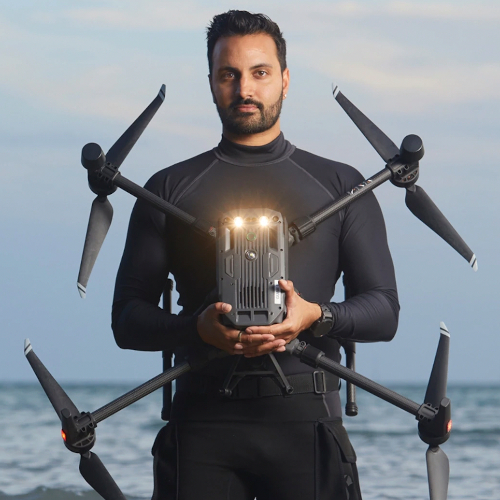
Member Since 2013
Ved Chirayath
Vetlesen Professor of Earth Sciences & Director, Aircraft Center for Earth Studies, University of Miami
AGU Research
Search
Filters
Clear All
Fluid Lensing and MiDAR for Airborne Coral Reef Monitoring at the sub-cm-scale
OCEAN SCIENCES 2024
marine ecology and biodiversity | 19 february 2024
Ved Chirayath
Sustained reef and marine habitat mapping is essential to coral reef conservation and management. Here, I present new technological developments behin...
View Abstract
OCEANOS: Engaging Hispanic/Latino Students in STEM by Integrating NASA Observations and Science with Hands-on Field Experiences
STRATEGIES FOR DEVELOPING STEM IDENTITY II ORAL
education | 15 december 2023
Juan L. Torres-Perez, Samuel Suleiman, Maria Barbe...
In the US, the Hispanic/Latino population constitutes the fastest growing ethnic group. By 2000, this group had already surpassed African Americans as...
View Abstract
MiDAR Fluid Lensing – Merging NASA’s MiDAR Active Multispectral Imaging Technology with Fluid Lensing for Next-Generation Aquatic Remote Sensing of Marine Systems and Debris
ADVANCES IN REMOTE SENSING FOR MONITORING BIODIVERSITY CHANGE: INTEGRATING DATA AND MODELS ACROSS SCALES AND TECHNOLOGIES IV ORAL
biogeosciences | 12 december 2023
Ved Chirayath, Cameron Hallett
We present recent developments in the development of MiDAR Fluid Lensing, merging NASAs MiDAR active multispectral imaging technology with fluid lensi...
View Abstract
Evaluating Global Benthic Habitat Maps Derived from Machine Learning: NASA's Neural Multimodal Observation and Training Network
ADVANCES IN REMOTE SENSING FOR MONITORING BIODIVERSITY CHANGE: INTEGRATING DATA AND MODELS ACROSS SCALES AND TECHNOLOGIES II ORAL
biogeosciences | 11 december 2023
Ana M Tarano, Ved Chirayath, Samuel Purkis, Haiwei...
Coral reefs are one of the most diverse ecosystems in the world and are facing significant changes due to anthropogenic climate change. It is importan...
View Abstract
Revealing the Ocean Deep: Next-Generation Sensing Technologies for Marine and Planetary Science
ADVANCES IN REMOTE SENSING FOR MONITORING BIODIVERSITY CHANGE: INTEGRATING DATA AND MODELS ACROSS SCALES AND TECHNOLOGIES I ORAL
biogeosciences | 12 december 2022
Ved Chirayath, Romina King
We have mapped more of the surface of the Moon and Mars than our own ocean floorbut that is changing. I present the latest developments behind three t...
View Abstract
Toward Global Coral Resilience and Biodiversity Assessments Using NASA NeMO-Net and Fluid Lensing
ADVANCES IN REMOTE SENSING FOR MONITORING BIODIVERSITY CHANGE: INTEGRATING DATA AND MODELS ACROSS SCALES AND TECHNOLOGIES III ORAL
biogeosciences | 12 december 2022
Ana M Tarano, Ved Chirayath, Michal Segal Rozenhai...
Coral reef ecosystems are undergoing rapid changes as a function of anthropogenic climate change. Habitat mapping of reefs using fused airborne fluid ...
View Abstract
Expanding NeMO-Net Machine Learning Capabilities for Citizen Science
SOLVING TRAINING DATA BOTTLENECKS FOR ARTIFICIAL INTELLIGENCE/MACHINE LEARNING IN EARTH SCIENCE ELIGHTNING
earth and space science informatics | 08 december 2020
Alan S. Li, Ved Chirayath, Jarrett van den Bergh, ...
NASA NeMO-Net, the neural multi-modal observation and training network for global coral reef assessment, is an open-source deep convolutional neural n...
View Abstract
NeMO-Net – The Neural Multi-Modal Observation & Training Network for Global Coral Reef Assessment
OCEAN SCIENCES 2020
marine ecology and biodiversity | 19 february 2020
Ved Chirayath, Alan S. Li, Sam Purkis, Michal Sega...
We present NeMO-Net, the first open-source deep convolutional neural network (CNN) and interactive learning and training software aimed at assessing t...
View Abstract